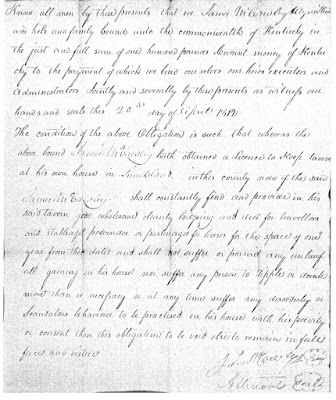Opening a
tavern or tippling house in the early 1800s was not as easy as stocking the
merchandise and hanging out a sign. Laws were in force and failure to abide by
those laws could result in a penalty and having the liquor seized.[1]
Every person
who wished to keep a tavern first had to petition the county court where the
tavern was to be located and obtain a license for one year. To obtain the
license, the prospective tavern keeper, along with his security or bondsman,
signed a bond promising to not allow gaming in his tavern, "suffer any
person to tipple or drink more than is necessary," or permit scandalous
behavior in his tavern. The tavern
keeper had to pay a fee to the court as well as a tax imposed by law. Early taverns were often located in the front room of a tavern keeper's own home.
A person who had previously obtained a license to keep a ferry was often not required to obtain a license if he later desired to open a tavern at his ferry.
The rates
and prices for liquor, lodging, diet, stableage and pasturage were fixed at least
twice a year by the justices of the
county court. These rates were to be posted in each tavern. Any person who
opened a tavern without a license was fined by the court and, if it happened a
second time, the offender could be charged a double penalty and have his liquor seized.
Below is the
handwritten tavern license signed by James McCawley and Ayres Stewart, his security,
in 1812 Livingston County, Kentucky. [2]
Tavern License - James McCawley 1812
At his house in Smithland
[1]
"Taverns and Tipling Houses,"
Digest of the Statute Laws of Kentucky, Vol. II, Title 171 (Frankfort, KY:
Albert G. Hodges), 1834: 1497-1504.
[2] Loose County Court Clerk's Papers, 1812,
Livingston County Clerk's Office.
Published 10 September 2015, Western Kentucky Genealogy Blog, http://wkygenealogy.blogspot.com/

No comments:
Post a Comment